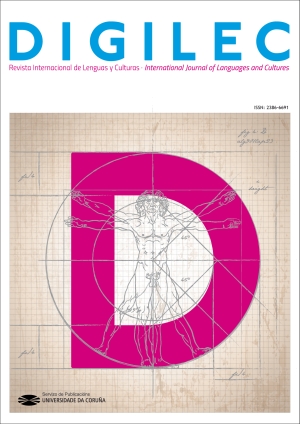Miss Jane y Miss Eyre: de alumna a profesora en Jane Eyre
Contenido principal del artículo
Resumen
Jane Eyre es considerada una de las novelas más significativas tanto del canon literario inglés como de la ‘novela de institutriz’. Sin embargo, aparte de su experiencia como institutriz, no se debería olvidar que, antes que todo, Jane era una alumna. La educación ha moldeado la vida de la protagonista y el argumento de la novela haciendo que sea uno de los temas principales de Jane Eyre y otras novelas de Charlotte Brontë como The Professor (1857) y Vilette (1853). El objetivo principal de este trabajo es estudiar como la educación ha moldeado a Jane Eyre tanto como alumna y profesora y como ha afectado a la resolución de la novela. Con este objetivo, se ha llevado a cabo una lectura detallada de la novela además de una contextualización sociocultural de la sociedad victoriana.
Palabras clave:
Descargas
Detalles del artículo
Citas
Alton, A. H. (1995). Teaching Women: Teacher and Taught in the Novels of Anne Brontë and Charlotte Brontë. Ontario: National Library of Canada.
Alqahtani, O. (2018). The Importance of the Absent Mother and Orphanhood in Emily Brontë’s Wuthering Heights and Charlotte Brontë’s Jane Eyre. Ann Arbor: ProQuest LLC.
Brontë, C. (1989). The Professor. 1857. London: Penguin Books.
Brontë, C. (1994). Jane Eyre. 1847. London: Penguin Books.
Brontë, C. (2004). Villette. 1853. London: Penguin Classics.
Craina, V. (2015). What Jane Eyre Taught: the “Autobiographer” in Jane Eyre and Women’s Education. B.A.S., 21, 39-47.
Davis, N. L. (2009). “Clearing the Sill of the World”: Jane Eyre and the Power of Education in the Nineteenth-Century Novel. Forum on Public Policy Online, 2, 1-13.
Edgeworth, M. (2008). The Good French Governess. London: Dodo Press.
Godfrey, E. (2005). “Jane Eyre”, from Governess to Girl Bride. SEL, 45 (4), 853-871.
Gruener, E. E. (2016). Jane Eyre and Education. The Cupola Scholarship at Gettysburg College. Student Publications 473. https://cupola.gettysburg.edu/student_scholarship/473/
Hampe, M. (2016). “To Grow Up Clean”: Jane Eyre and Education. Ann Arbor: ProQuest LLC.
H.S., S. (2010). Anecdotes of Mary; or, the Good Governess. Michigan: Gale Ecco, 2010.
Hughes, Kathryn. (2001). The Victorian Governess. London: Hambledon Continuum.
Hughes, Kathryn. (2014) The Figure of the Governess. The British Library. https://www.bl.uk/romantics-and-victorians/articles/the-figure-of-the-governess. Retrieved: 28/10/2020.
Nestor, P. (1985). Female Friendships and Communities: Charlotte Brontë, George Elliot, Elizabeth Gaskell. Oxford: OUP.
Rogers, R. (1995). Boarding Schools, Women Teachers, and Domesticity: Reforming Girls' Secondary Education in the First Half of the Nineteenth Century. French Historical Studies, 19 (1), 153-181.
Shuttleworth, S. (2014). Jane Eyre and the 19th-century Woman. The British Library. https://www.bl.uk/romantics-and-victorians/articles/jane-eyre-and-the-19th-century-woman. Retrieved: 28/10/2020.
Tormahlën, M. (2007). The Brontës and Education. Cambridge: CUP.
Wadsö, Cecilia. (2000). The Victorian Governess Novel. The Victorian Web. http://www.victorianweb.org/gender/wadso2.html. Retrieved: 28/10/2020.


